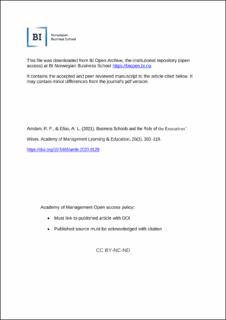Business schools and the roles of the executives' wives
Journal article, Others
Accepted version
Permanent lenke
https://hdl.handle.net/11250/3073208Utgivelsesdato
2021Metadata
Vis full innførselSamlinger
Originalversjon
10.5465/amle.2020.0129Sammendrag
This article shows how historical studies enrich our understanding of imprinting theory and can further our knowledge about gender in business schools. In the founding period of executive education following World War II, rather than excluding women from participation, U.S. business schools included women as wives in the socialization process as their husbands trained for top corporate manager positions. We contend that the imprint of the separate spheres ideology, whereby men and women engaged in different aspects of social and economic life, persisted in subsequent decades despite business schools’ efforts to more fully integrate women into the classroom. The article makes two contributions to imprinting theory. First, it shows how a historical approach to studying ideological imprints from a founding period develops our knowledge as to why some imprints persist over time. Second, it extends our understanding on how to study imprints in a multilevel context. Our empirical data draw from the archives of leading business schools, as well as from academic literature, popular business articles, media reports, and a literary novel.

